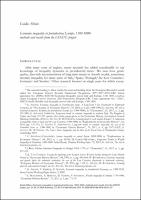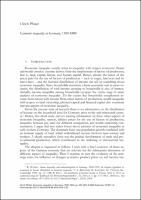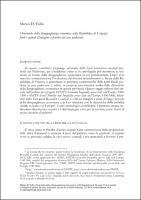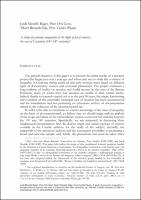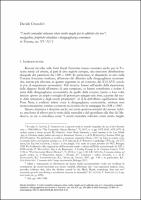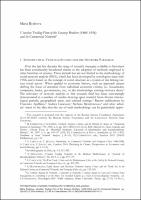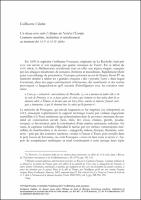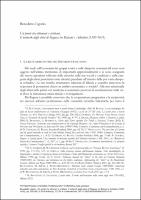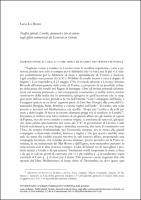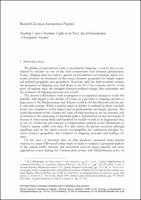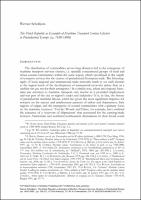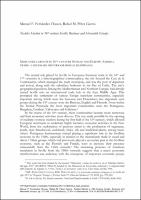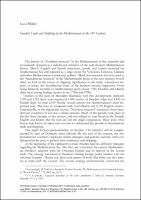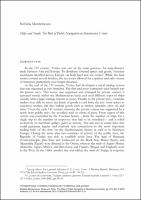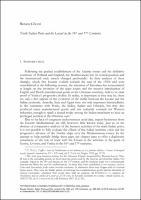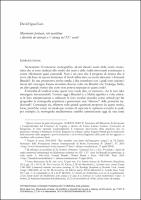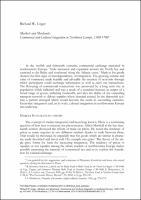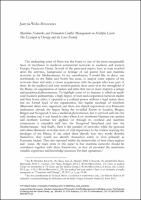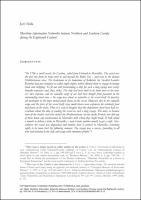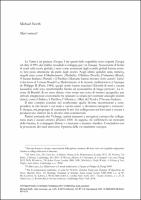Book chapters: Recent submissions
Now showing items 4101-4120 of 6042
-
(2020)This article provides an overview of the research done in recent years by the ERC-funded projects EINITE-Economic Inequality across Italy and Europe 1300-1800, and SMITE-Social Mobility and Inequality across Italy and ...
-
(2020)The chapter reviews existing evidence regarding four aspects of economic inequality: relative factor rents, which relate to the factorial distribution of income and also underlie the so-called Williamson index (y/wus), ...
-
(2020)This paper presents an analysis of the available primary sources and the existing methods to reconstruct the tendencies of the economic inequality in the Venetian Mainland, focusing on the case of Padua and its province, ...
-
(2020)This essay aims to present the first results of an ongoing research project devoted to study the evolution of the economic inequality in Catalonia based on different documentary sources and parameters. Here we focus on the ...
-
(2020)This paper studies through a quantitative analysis at micro-scale (the pieve of San Giovanni in Petroio in Mugello) in 1427-1512 the relation between the growing economic inequality of the Florentine rural society found ...
-
(2019)This paper contributes to the discussion of merchant networks in late medieval Europe by presenting a case study of the Soranzo fraterna, a Venetian trading firm which comprised brothers Donado, Giacomo (Jacopo), Piero, ...
-
(2019)This article describes the activity of a network of Corsican merchants and sailors active in the Western Mediterranean between the sixteenth and the seventeenth century, in particular in Tunis, Marseille, Leghorn and the ...
-
(2019)The research analyzes the network of the Ragusan Jews between the end of 16th and the begin of 17th century. It focalized the social and economic links of the Sephardic group as “trait d’union” of the Adriatic-Balkan trade ...
-
(2019)Genoese merchants, who certainly did not disappear after 1627, during the second half of the century were able to establish new global-scale commercial networks on a par with those of other merchant communities (those of ...
-
(2019)The present collaborative work in progress is an empirical attempt verifying the interplay between political change, fleet nationality, and the evolution of shipping networks. On the basis of historical data on ship positions ...
-
(2019)By means of a comparative analysis of the ‘Dutch case’ with the Saintonge in South-West France and Bohuslän in South-West Sweden, this paper analyses the rise and decline of maritime services clusters in preindustrial ...
-
(2019)This work offers a new interpretation about the main groups implicated in the textile trade in Seville during the 16th century, proposing a new chronology concerning the substitution processes happened between them and the ...
-
(2019)This paper analyses the rise of Swedish trade and shipping in the Mediterranean in the eighteenth century. It focuses on three factors that shaped Sweden’s role in the area: foreign policy interest, foreign trade policy ...
-
(2019)The paper aims at understanding the role that public navigation played for the Venetian merchant firms in the Renaissance. Thanks to the use of accountability, two case studies will be analysed to understand the involvement ...
-
(2019)The chapter analyzes, from a diachronic perspective, the role of trade with the Levant in the port industries of Genoa, Livorno, and Venice in the 16th and 17th centuries. An historical period in which the international ...
-
(2019)An analysis of Valencia’s fifteenth-century port activity functional to the study of the city’s diverse maritime networks and markets based on first-hand archive research mainly focusing on the second half of the fifteenth ...
-
(2019)Between the thirteenth and seventeenth centuries commerce in northern Europe expanded and contracted. The long term net effect of the trade increase was an overall substantial impact on the economy and on the culture of ...
-
(2019)This article argues that a novel way to analyse maritime networks in premodern northern Europe is to trace the activities of people involved in conflict management. These people were traders, magistrates, judges, urban ...
-
(2019)International trade during the 18th century is a case in point through which to study in-depth the challenges of asymmetric information. The challenges can be divided into three categories: availability, reliability and ...
-
(2019)Following Fernand Braudel’s Méditerranée, historians interpreted the Mediterranean, Baltic, Atlantic, Indian Ocean or Pacific as closed maritime systems, consisting of multiple micro-environments. This essay seeks to ...

